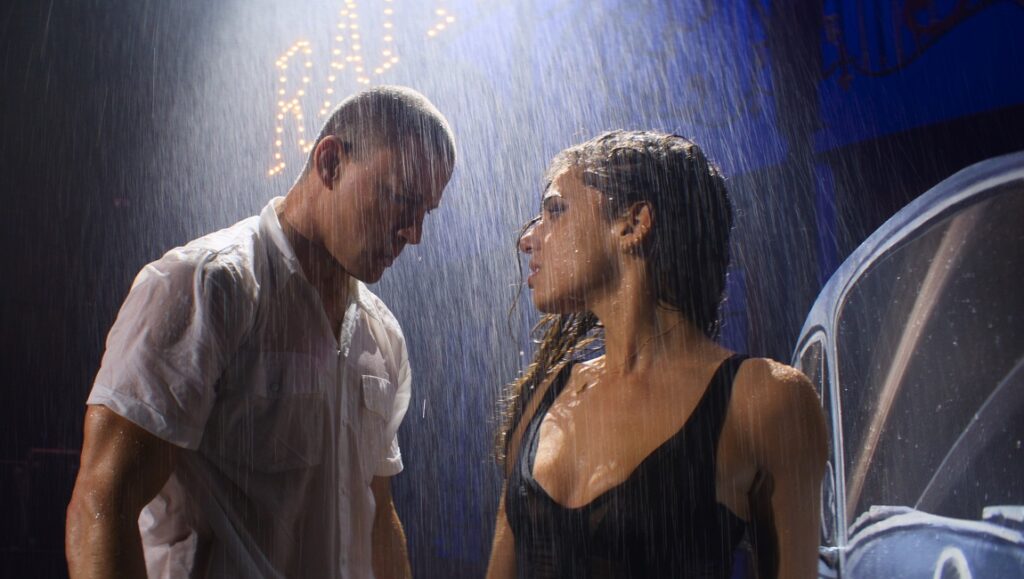“What are your plans for Act Three?” asks one character of Channing Tatum’s Mike about the show he’s directing in Magic Mike’s Last Dance, the third overall and second Steven Soderbergh-directed entry in the male-stripper series created by Soderbergh in collaboration with writer Reid Carolin and (in this case) producer Gregory Jacobs. The reply? “We’re gonna have one.” In one of the most self-reflexive films of Soderbergh’s career, this line stands out for its honesty about both the aimlessness and the underdog charm of the project. The film — Soderbergh’s first to be released in theaters after five consecutive streaming releases — is rife with anxieties about the pressures of pleasing both crowds and producers, and the result is a work whose eccentricities are both frustrating and fascinating.
Last Dance opens with Mike bartending a fundraising event held by wealthy, emotionally fragile recent divorceé Maxandra Mendoza (Salma Hayek). Mike’s furniture business has fallen victim to the latent economic anxieties that have always marked this series. After catching wind of Mike’s former profession, Maxandra entices him into a private after-hours dance that both sets the film on its path and, unfortunately, is where the movie peaks. The promise of the Magic Mike films is largely that they tap into pleasures that the American cinema has all but left behind — sex appeal, yes, but also the capturing of physical performance, the expressiveness of seeing movie stars do things with their bodies that most of us can’t fathom accomplishing (“A body in motion is always sexy as fuck,” goes one line). The movie is at its best when hewing closer to that promise, and the extended, intimate pas de deux between these two middle-aged sex symbols is where it does so most memorably.
It’s the aftermath of that scene, in which Hayek convinces Tatum to follow her to London for a month with a mysterious promise of employment, where things start to get rocky. In a story apparently inspired by the genesis of Tatum’s real-life Magic Mike London stage show, Maxandra enlists Mike to direct a male stripper revue in the stuffy West End theater left to her in the divorce. Soderbergh can always be counted on to attempt a new narrative experiment or genre riff with each picture, and the “let’s put on a show” musicals of the ‘30s — Gold Diggers of 1933, Footlight Parade — are a fitting inspiration. Outside the theater, however, the movie shifts into something few would have expected from the franchise: a gentle, languid family drama.
As the emotional attachment between Mike and Maxandra grows, her precocious teen daughter Zadie (Jemelia George, her first screen role) and mysterious butler Victor (Ayub Khan-Din, terrific in his first since Stephen Frears’ Sammy and Rosie Get Laid in 1987) emerge as the film’s two major supporting characters. The movie’s insistence on low-keyness feels refreshing — this is surely one of the lowest-stakes studio releases in recent years — if not particularly rewarding. Soderbergh can’t be blamed for not attempting to recreate the nonstop bacchanalia that has made XXL something of a modern classic, but Last Dance too often hits the exact pitfalls that film eschewed. Soderbergh is at his best when his material expands the range of his talents — here, he feels constrained by a script that, worse than being fairly undercooked, plays to the opposite of his talents.
The family drama feels strangely thin and unmotivated — we wonder why we’re spending so much time with these people, and Last Dance struggles to give us much of an answer. Director/cinematographer/editor Soderbergh also feels stylistically reined in here — the last time he absconded to Europe for a sequel, he synthesized the continent’s aesthetic influences for the bravura formal achievement of Ocean’s Twelve. Despite his career-long inspiration from the likes of Roeg, Boorman, and Lester, the London setting doesn’t invigorate in the same way. Most disappointingly, the treatise on female desire and empowerment that runs through the series gets its most didactic treatment here, spelled out in dialogue or in Zadie’s book-report narration on the societal function of dance rather than embodied in its performances.
It’s telling that this movie finds Mike moving, somewhat, from the role of performer to director, as Last Dance is largely about the struggle to create art in a world hostile to it, where reliance on a wealthy benefactor is the only option left to the artist. Indeed, the movie’s most potent wish fulfillment may be Soderbergh’s own — imagine if you got your money from Salma Hayek instead of the likes of David Zaslav. The show, when it comes, is worth the wait, heartwarming and dazzling in equal measure, and topped with a truly perilous-feeling, rain-drenched duet from Tatum and dancer Kylie Shea. In moments like these, the talent involved becomes undeniable — it’s nice to be in the hands of a director who actually knows how to fill out a widescreen frame, or how to judiciously employ handheld or close-ups for emotional effect. Tatum, likewise, once again proves himself to be one of the most talented, reliable, and selfless stars of his generation. In the end, however, the diminishing returns of Magic Mike’s Last Dance may be its most lasting commentary on the worlds of art and commerce — one just keeps trying to get the magic back however one can, until the compromises and disappointments met along the way become the story itself.
Published as part of InRO Weekly — Volume 1, Issue 6.


Comments are closed.